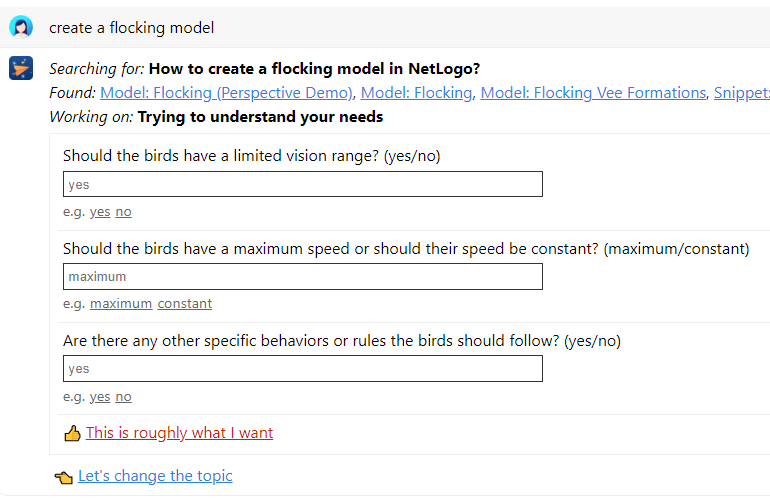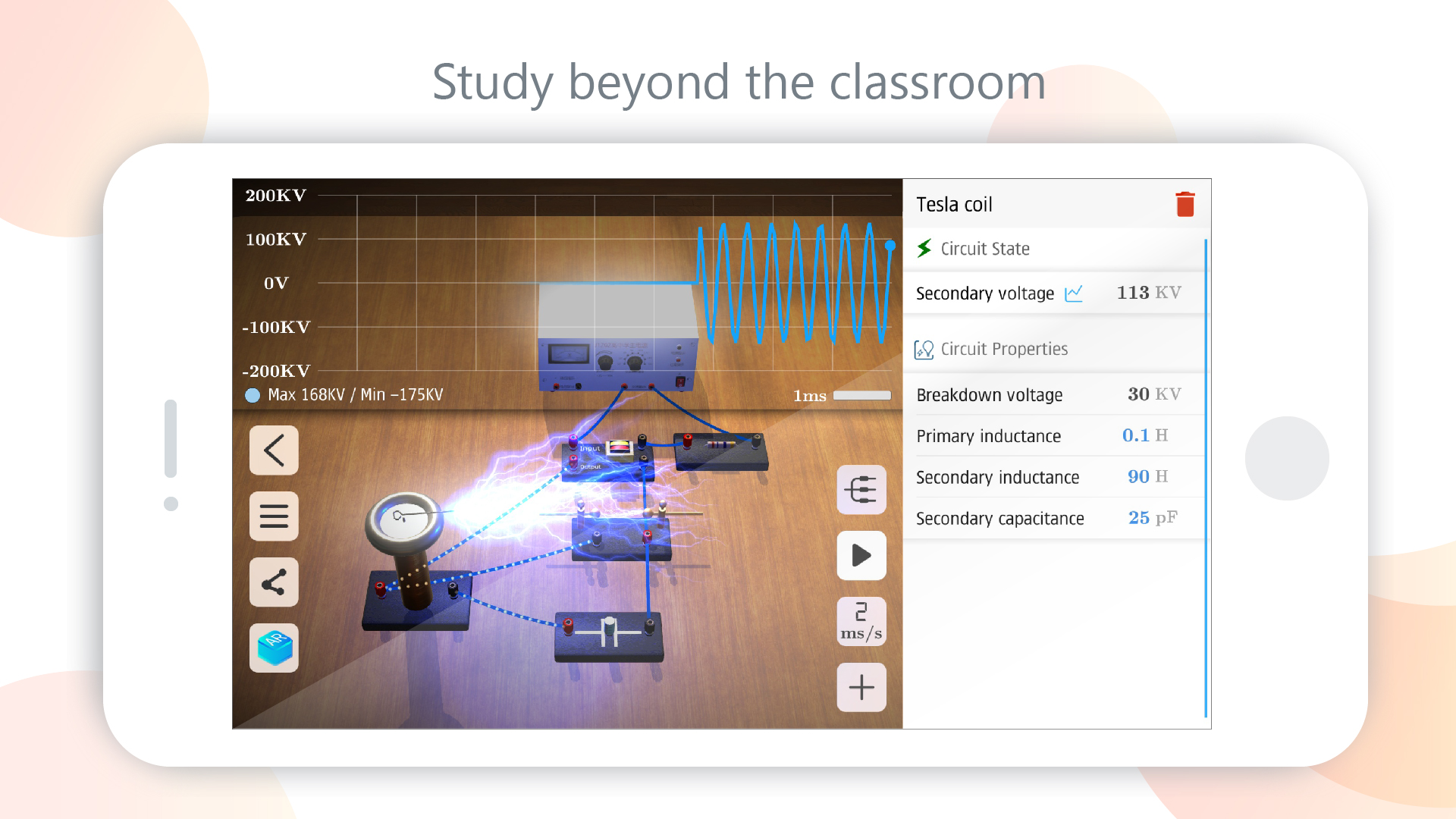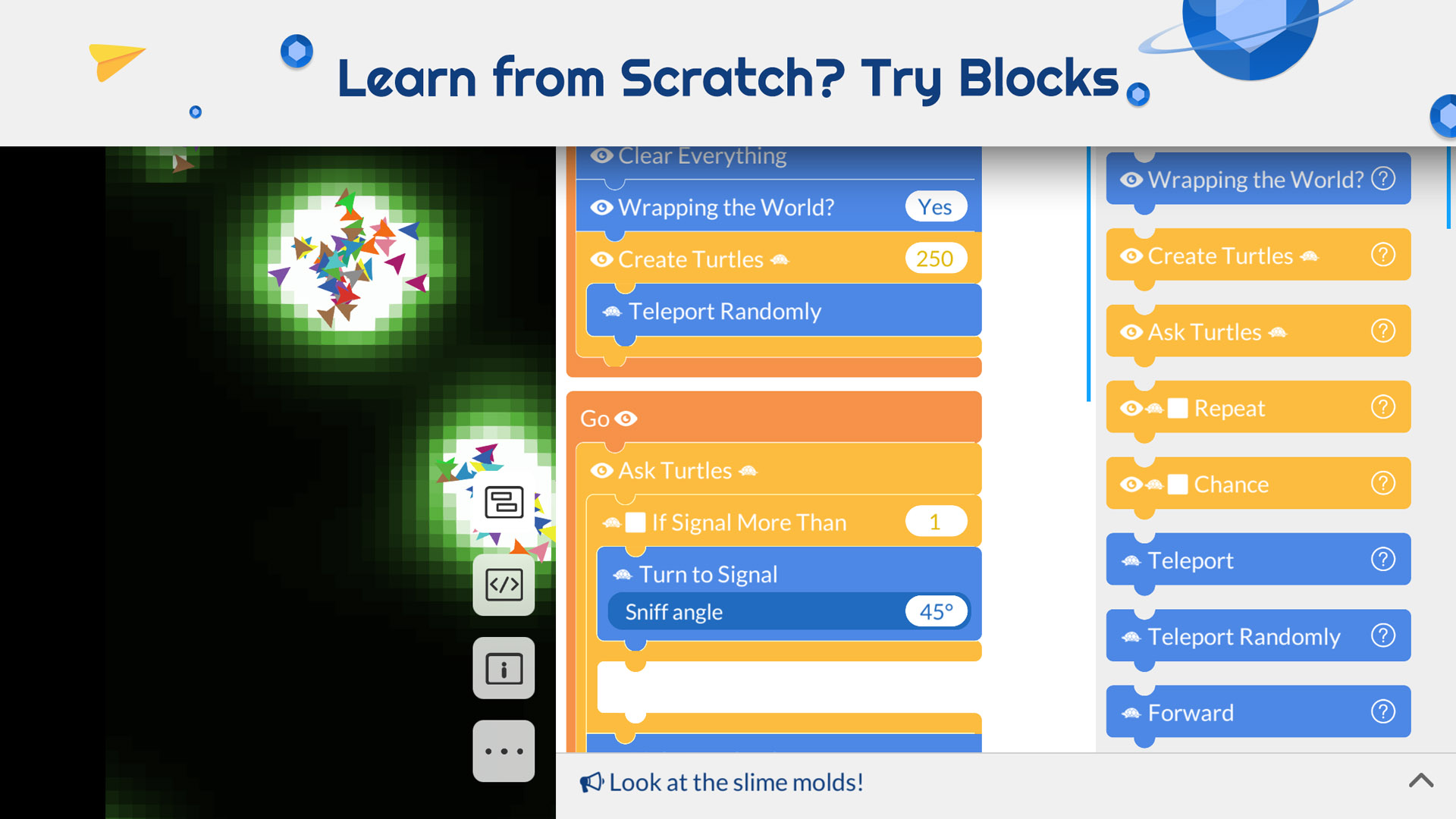Sitemap
A list of all the posts and pages found on the site. For you robots out there is an XML version available for digesting as well.
Pages
Posts
portfolio
NetLogo AR (2023-Present)
NetLogo AR is a spatial AR authoring toolkit that combines room-scale AR technology with NetLogo, a popular agent-based programming language. Part of Turtle Universe, the mobile version of NetLogo, it allows users to create simulations that blend digital content with real-world environments. Built on NetLogo’s strengths for research and education, it enables users to model complex systems, fostering creativity in applications like games and art, making it ideal for K-12 learners and researchers.
NetLogo Chat (2023-Present)
NetLogo Chat is an innovative LLM-powered interface designed to enhance learning and practice in NetLogo, a leading language for agent-based modeling (ABM). ABM simulates complex systems using simple rules applied to agents, with applications in fields like disease spread and ecology. Unlike general-purpose LLM tools, NetLogo Chat addresses ABM’s unique challenges by aligning conceptual designs, code, and real-world phenomena. Built on constructionist learning principles, it empowers users to create meaningful models while integrating authoritative sources, supporting troubleshooting, and fostering human-AI collaboration within the NetLogo IDE. 
Physics Lab AR (2017-Present)
Physics Lab AR, founded in 2017, is a mobile app that lets learners create and explore virtual physics experiments. Initially designed for high school students, the app quickly attracted a larger audience, including K-12 students outside the classroom. By 2019, it reached over 1 million users, and by 2024, nearly 7 million worldwide.
Tortuga (2021-2023)
Tortuga is a novel technical system for building interactive scaffolds for Agent-based Modeling and Programming (ABM & P) in NetLogo. It lowers the threshold and raises the ceiling for constructionist curricular designers by allowing them to build interactive scaffolds with simple NetLogo commands. These scaffolds can be aware of computational models’ emergent behaviors and react to learners’ interactions in modeling spaces.
Turtle Universe (2019-Present)
A mobile incarnation of NetLogo, the most widely used agent-based modeling environment, Turtle Universe is dedicated to younger learners and educators on phones and tablets. Some highlights include built-in multilingual, block-based programming, and interactive tutorials. By May 2024, it has been used by 104,539 people around the world.
Vox Deorum (2025-Present)
Vox Deorum is an AI-enhanced modification for Civilization V that introduces large language model (LLM) powered AI opponents. Built on the Community Patch + Vox Populi framework, it allows players to engage with AI civilizations using advanced language models like GPT and Claude, transforming traditional game AI into contextually aware and conversational opponents. The project demonstrates a hybrid LLM architecture that achieves competitive gameplay through 2,327 complete game simulations.
publications
Self-Governed Collaborative Inquiry in Action: A Case Study of a Large-Scale Online Youth Community.
Published in Proceedings of ISLS Annual Meeting, 2022
This study explores Physics Lab’s Online Community (PLOC), a large-scale youth community with over 138,000 projects, and uses the Community of Inquiry (CoI) framework to demonstrate that cognitive, social, and teaching presences can emerge collaboratively among youths without instructor intervention.
Recommended citation: Chen, J., Zhao, L., Xiao, F., Horn, M. S., & Wilensky, U. J. (2022). Self-Governed Collaborative Inquiry in Action: A Case Study of a Large-Scale Online Youth Community. Proceedings of ISLS Annual Meeting 2022.
Download Paper
Interactive Constructionist Scaffolds for Agent-Based Modeling and Programming in NetLogo.
Published in FabLearn / Constructionism: Full and Short Research Papers, 2023
This paper examines the advantages of interactive scaffolds in constructionist learning for Agent-based Modeling and Programming (ABM & P), introducing the Tortuga system, and finding that exploration-oriented and programming-oriented scaffolds significantly enhance learner engagement in ABM & P activities in out-of-school online contexts.
Recommended citation: Chen, J., Horn, M. S., & Wilensky, U. J. (2023a). Interactive Constructionist Scaffolds for Agent-Based Modeling and Programming in NetLogo. FabLearn / Constructionism 2023: Full and Short Research Papers.
Download Paper
Tortuga: Building Interactive Scaffolds for Agent-based Modeling and Programming in NetLogo.
Published in Proceedings of ISLS Annual Meeting, 2023
This study explores Physics Lab’s Online Community (PLOC), a large-scale youth community with over 138,000 projects, and uses the Community of Inquiry (CoI) framework to demonstrate that cognitive, social, and teaching presences can emerge collaboratively among youths without instructor intervention.
Recommended citation: Chen, J., Horn, M. S., & Wilensky, U. J. (2023b). Tortuga: Building Interactive Scaffolds for Agent-based Modeling and Programming in NetLogo. Proceedings of ISLS Annual Meeting 2023.
Download Paper
The Pocketworld Playground: Engaging online, out-of-school learners with Agent-based Programming.
Published in Proceedings of the ACM Interaction Design and Children (IDC), 2023
This study highlights the benefits of introducing agent-based programming (ABP) to youth, presenting the design of the Pocketworld Playground (POP) within Turtle Universe to engage out-of-school learners in ABP, and finding that POP effectively fostered interest and participation in ABP practices while contributing to the online community.
Recommended citation: Chen, J., Zhao, L., Horn, M. S., & Wilensky, U. J. (2023). The Pocketworld Playground: Engaging online, out-of-school learners with Agent-based Programming. Proceedings of the ACM Interaction Design and Children (IDC) 2023.
Download Paper
“Oh My God! It’s Recreating Our Room!” Understanding Children’s Experiences with A Room-Scale Augmented Reality Authoring Toolkit.
Published in Proceedings of the CHI Conference on Human Factors in Computing Systems, 2024
This study introduces NetLogo AR, an authoring toolkit for room-scale AR experiences that integrate AR with computational models, finding that children aged 11-13 were highly engaged in spatial thinking activities during eight-week participatory design sessions, and proposing a new AR design framework focused on spatial movement and exploration.
Recommended citation: Chen, J., Zhao, L., Li, Y., Xie, Z., Wilensky, U., & Horn, M. (2024, May). “Oh My God! It’s Recreating Our Room!” Understanding Children’s Experiences with A Room-Scale Augmented Reality Authoring Toolkit. In Proceedings of the CHI Conference on Human Factors in Computing Systems (pp. 1-17).
Download Paper
Learning Programming of Agent-based Modeling with LLM Companions: Experiences of Novices and Experts Using ChatGPT & NetLogo Chat.
Published in Proceedings of the CHI Conference on Human Factors in Computing Systems, 2024
This study introduces NetLogo Chat, an LLM-based interface for learning and practicing NetLogo for ABM, finding that experts perceive more benefits and are more likely to adopt LLMs than novices, and highlighting the need for guidance, personalization, and integration in LLM-based programming tools.
Recommended citation: Chen, J., Lu, X., Du, Y., Rejtig, M., Bagley, R., Horn, M. S., & Wilensky, U. J. (2024). Learning Programming of Agent-based Modeling with LLM Companions: Experiences of Novices and Experts Using ChatGPT & NetLogo Chat. Proceedings of the 2024 CHI Conference on Human Factors in Computing Systems.
Download Paper
Vox Deorum: A Hybrid LLM Architecture for 4X / Grand Strategy Game AI – Lessons from Civilization V
Published in arXiv preprint, 2025
This paper explores using Large Language Models (LLMs) in complex strategy games through Vox Deorum, a hybrid LLM+X architecture for Civilization V with Vox Populi mod. Through 2,327 complete game simulations, the research demonstrates that LLMs can achieve competitive end-to-end gameplay with unique play styles by handling macro-strategic reasoning while delegating tactical execution to specialized subsystems.
Recommended citation: Chen, J., et al. (2025). Vox Deorum: A Hybrid LLM Architecture for 4X / Grand Strategy Game AI -- Lessons from Civilization V. arXiv preprint arXiv:2512.18564.
Download Paper
talks
NetLogo Mobile: An Agent-Based Modeling Platform and Community for Learners, Teachers, and Researchers
Published:
Since 2020, NetLogo Mobile has been developed into Turtle Universe, a full-fledged agent-based modeling and programming app for children, educators, and enthusiasts. It is the foundation of Tortuga (an editor for interactive tutorials), NetLogo AR, and NetLogo Chat. By May 2024, it has been used by 105,932 people around the world.
NetLogo Mobile: Introduction to A New Incarnation of NetLogo with embedded tools for Designing Interactive Scaffolds
Published:
Since 2020, NetLogo Mobile has been developed into Turtle Universe, a full-fledged agent-based modeling and programming app for children, educators, and enthusiasts. It is the foundation of Tortuga (an editor for interactive tutorials), NetLogo AR, and NetLogo Chat. By May 2024, it has been used by 105,932 people around the world.
Measuring Young Learners’ Open-ended Agent-based Programming Practices with Learning Analytics
Published:
This study introduces a method to measure young learners’ agent-based programming practices using a 4-stage model, analyzing 2,300 projects from the Turtle Universe online community to highlight differences in ABP practices across various stages and modalities, and discussing implications for block-based ABP environments.
NetLogo AR: Bringing Room-Scale Real-World Environments Into Computational Modeling for Children
Published:
NetLogo AR is an authoring toolkit designed to transform NetLogo agent-based computational models into room-scale AR experiences, aimed at enhancing learning by integrating real-world inputs and facilitating AR design for researchers, educators, and children.
Velo: Exploring Animal Behavior Modeling through Hybrid Robotics-Simulation Learning Experience
Published:
Velo is an educational tool that integrates robotics and simulation to teach a programming model inspired by Braitenberg vehicles, enabling learners to create complex behaviors by connecting sensors and actuators, and to analyze and program animal-like behaviors.
ChatLogo: A Large Language Model-Driven Hybrid Natural- Programming Language Interface for Agent-Based Modeling and Programming
Published:
ChatLogo is a hybrid natural-programming language interface for agent-based modeling that combines conversational interactions and computational learning, featuring an intelligent command center and user-friendly interface to support novice learners.
Creative Expression through Color and Sound: A NetLogo Model for the Sonification of Color and the Visualization of Sound
Published:
Li, Y., & Chen, J. (2023). Creative Expression through Color and Sound: A NetLogo Model for the Sonification of Color and the Visualization of Sound. Proceedings of FabLearn/Constructionism 2023.
teaching
2022 - Designing and Constructing Models with Multi-Agent Languages
Graduate / Advanced Undergraduate Course, Northwestern University, Computer Science, 2022
In the spring quarter of 2022, I served as a teaching assistant of COMP_SCI 372/472, an undergraduate/graduate class for agent-based modeling. I participated in the course and syllabus design; provided customized feedback for students each week; worked with 8 advanced undergraduate and graduate students on individual final projects; and taught several sections of the class.
2023 - Design of Technological Tools for Thinking and Learning
Graduate / Advanced undergraduate course, Northwestern University, Learning Sciences and Computer Science, 2023
In the winter of 2023, I served as a teaching assistant of LRN_SCI 426/CS 496, an undergraduate/graduate class for learning technology design. I participated in the course and syllabus design; provided customized feedback for students each week; worked with advanced undergraduate and graduate students on individual final projects; and taught several sections of the class.
2024 - Designing and Constructing Models with Multi-Agent Languages
Graduate / Advanced undergraduate course, Northwestern University, Computer Science, 2024
In the spring quarter of 2024, I served as a teaching assistant of COMP_SCI 372/472 again, an undergraduate/graduate class for agent-based modeling. I participated in the course and syllabus design; provided customized feedback for students each week; worked with 14 advanced undergraduate and graduate students on individual final projects; and taught dozens of sections throughout the quarter.
